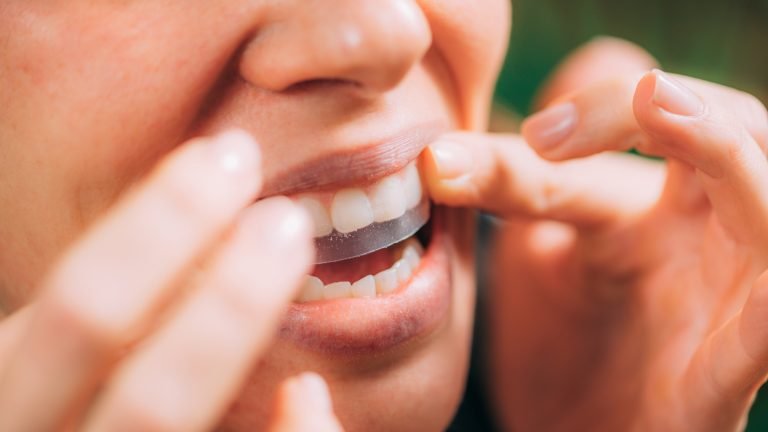Use teeth whitening strips after at least 30 minutes after brushing.
Whitening strips can be of great help in getting rid of yellow teeth. However, you need to use them correctly; otherwise, you risk conditions such as increased sensitivity, damaged enamel, and gum irritation.
This article answers some common questions regarding brushing and white strips. We also share some great tips on using a whitening agent for optimal results.
How Do Teeth Whitening Strips Work?
Before discussing anything related, you need to know how whitening strips work.
Teeth whitening strips typically contain hydrogen peroxide or carbamide peroxide as the active ingredient. They bleach the tooth enamel when applied to teeth, dissolving any stain-causing molecules on the surface.
The strips can also bleach Chromogens, the molecules found in food and drink that stick to the interior parts of your teeth.
Should You Brush Your Teeth Before Using Whitening Strips?
Yes, you need to brush your teeth before thirty minutes of applying the teeth whitening gel. There are two reasons for this:
- To remove any debris blocking the path of the strips.
- To open up the pores in your teeth so that more whitening strips can seep in.
In this case, ensure you don’t use toothpaste, especially the fluoridated ones. If you do that, tiny fluoride particles can enter the pores, obstructing the strips.
What Happens if You Don’t Brush Your Teeth Before Whitening?
Well, you will end up whitening the dirt and tartar on your teeth. Also, as less peroxide reaches the enamel, the effectiveness of the strip decreases.
Type of Toothbrush to Use
Regular use of whitening strips puts you at a higher risk of increased tooth sensitivity. Thus, you should only use a brush with very soft bristles to protect your teeth. Also, change your toothbrush every three months, as bristles get hard over time.
What Happens if You Immediately Brush Your Teeth Before Applying The Whitening Gel?
When applying the whitening gel immediately after brushing, you risk damaging the enamel and gums. Enamel and gums become soft after you brush your teeth, which means they are prone to be bleached more than needed.
What About Brushing After Whitening?
Wait a few hours before brushing your teeth after the whitening process.
Also, make sure only to use white toothpaste. If you use a colored one, the color from the toothpaste can dye the teeth.
Whitening Strips and Flossing
Since your teeth should be as clean as possible before whitening, it is recommended to floss 30 minutes before applying the strips. On the other hand, floss only a couple of hours after you whiten your teeth. Do it ever so gently to avoid gum irritation.
Taking Care of Your Teeth While Using Whitening Agent
Here is how you can take care of your teeth when using a whitening agent.
Choose the Right Product
These are the things you need to analyze while choosing the best whitening strips for your need:
- How long do you need to keep them on?
- What’s the taste like?
- How much time will it take for the product to whiten teeth?
- Will the strip fit on your teeth?
- Are there any harsh chemicals that could cause adverse effects on your teeth?
If possible, consult a medical professional before using an active whitening agent.
Don’t Use More Than Needed
Since whitening strips have bleaching agents, applying more than needed will not only remove the stain but also layers of your enamel. Always read the package instructions for how many strips you should apply to your teeth.
Apply Everywhere
Touch every spot on your teeth with the strips. Otherwise, the whitening will be inconsistent, causing the stains to stand out more.
Let it Sit As Per the Package Instructions
The peroxide gel will take some time to enter the insides of your teeth. Hence, you must be patient and let it sit as per the manufacturer’s instructions. On the other hand, allowing it to sit on your teeth for more time than needed will damage the tissues.
Avoid Putting on Gums
Your gums are made of softer tissues than the teeth. So bleach can cause significant damage, ranging from irritation to chemical burns. Hence, you must avoid touching the gums when applying whitening strips.
Don’t Eat Colored Food After Whitening
Some foods are known to stain your teeth more than others. They include:
- Tea and Coffee
- Curry and Spices
- Coho
- Hard Candy
- Tomato Sauce
- Cola
- Red Wine
- Chocolates
- Fruit Juice
- Anything with soy sauce in it
- Berries
- Beetroot
You will have to avoid them as much as possible.
Limit Acidic Foods
In addition to colored foods, you will also need to limit food that may cause an acid attack on your teeth. Don’t eat these foods for at least a day after whitening your teeth:
- Alcohol
- Lemon, Orange, and other citric fruits
- Grapefruit
- Plums
- Sugar
Tip: Sour foods are acidic. Avoid them.
Other Tips for Maintaining White Teeth
Here are some other ways to whiten dark teeth and maintain your teeth’s glow.
- Brush your teeth at least two times a day. Don’t brush immediately after eating, especially if you eat acidic food or have acid reflux.
- Avoid smoking cigarettes. The nicotine and tar in the cigarette can cause stains.
- Many fruits and vegetables like apples, peach, celery, and carrot trigger saliva protection in your mouth, washing away the bacteria and debris that cause staining. Eat plenty of them.
- Do oil pulling at least once a week, preferably with coconut oil. This is an ancient Indian remedy for removing plaque where you swirl the oil around your mouth for about half an hour. Scientific studies have shown it to be very effective in reducing the number of bacteria in your teeth.
FAQs Related to How Long After Brushing Teeth Should You Use Whitening Strips
Here are a few other common questions people ask.
Will Whitening Strips Hurt My Teeth?
No, you shouldn’t feel any pain while applying them. However, using more than needed will lead to enamel corrosion, resulting in increased tooth sensitivity.
Should I Use Tooth Whitening Products if I Have Sensitive Teeth?
You need to consult a dentist for any case of tooth sensitivity that lasts for more than four weeks. Also, seek medical help if your teeth become highly sensitive after using the product.

